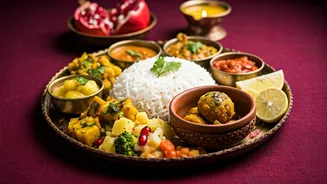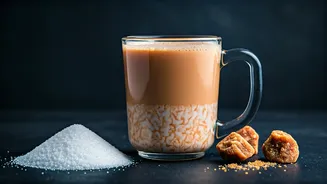Embrace Balanced Eating
The key to a healthy Diwali feast is balance. It's not about depriving yourself of traditional treats, but rather about making mindful choices and incorporating
nutritious foods. Start by planning your meals in advance. This helps you to make conscious decisions about what you eat. Include a variety of colorful vegetables and fruits. These provide essential vitamins, minerals, and fiber, which aid digestion and keep you feeling full. Don’t forget lean protein sources like grilled chicken or fish alongside your festive dishes. Try to limit the intake of deep-fried items. Instead, opt for baking, grilling, or air frying.
Smart Sweet Swaps
Diwali is synonymous with sweets, but you can make healthier choices without sacrificing taste. Replace refined sugar with natural sweeteners like dates, jaggery, or honey in your sweets. These options offer additional nutrients compared to refined sugar. When making sweets at home, consider using whole wheat flour or almond flour instead of all-purpose flour. Experiment with healthier cooking methods. Try baking instead of frying. If you're buying sweets, opt for options that are lower in sugar and fat. Look for traditional sweets made with healthier ingredients and in smaller portions. Moderation is key. Enjoy your sweets in small portions and savor each bite.
Healthy Snack Alternatives
During Diwali, snacking is an integral part of the celebrations. You can easily create a spread of healthy snacks. Instead of relying on fried snacks, opt for roasted nuts and seeds, which are packed with healthy fats and protein. Prepare a platter of fresh fruits and vegetables with a homemade dip, such as hummus or a yogurt-based dip. These are hydrating and provide essential nutrients. Air-popped popcorn, when seasoned appropriately, can be a lower-calorie snack. When choosing store-bought snacks, read the labels carefully. Look for options low in sodium, unhealthy fats, and added sugars. Portion control is especially important for snacks. Pre-portion your snacks to avoid overeating.
Mindful Hydration Habits
Staying hydrated is crucial for overall health, especially during festive seasons. Make sure to drink plenty of water throughout the day. Water aids digestion, helps to flush out toxins, and can prevent overeating. Consider adding herbal teas or infused water (with fruits and herbs) to your beverages. These are refreshing, hydrating, and may offer additional health benefits. Limit your intake of sugary drinks like sodas and fruit juices. These drinks add empty calories and can lead to weight gain. Alcohol consumption is often associated with celebrations, but it’s essential to drink in moderation. Alternate alcoholic drinks with water to stay hydrated. Be aware of your thirst cues and drink water before, during, and after meals.
Portion Control Strategies
Portion control can make a significant difference during a festive season, where tempting dishes abound. Use smaller plates and bowls to limit the amount of food you consume. Serving smaller portions can also help you feel more satisfied. Before piling food on your plate, assess the available options and choose a variety of dishes in smaller amounts. Take a break between servings. This allows your body to register when you’re full. Avoid eating directly from serving dishes, as this can lead to overeating. Instead, portion out your food onto your plate. Pace yourself while eating, savoring each bite. Eating slowly can help you feel more satisfied and prevent overeating.
Prioritize Physical Activity
Diwali is a time for celebration, but it's also important to stay active. Make time for physical activity amidst the festive hustle and bustle. Take a walk after your meals to aid digestion and burn extra calories. If you can, go for a quick workout at home. Even a short session can make a difference. Encourage your family and friends to join you in physical activities. This will add some fun and strengthen your bonds. Consider incorporating dance into your celebrations. Dancing is a fun and effective way to burn calories and boost your mood. Schedule exercise in your routine, treating it as an important part of your day.
Healthy Cooking Techniques
The cooking techniques you use can have a significant impact on the healthiness of your Diwali feast. Bake, grill, or air fry your food instead of deep-frying it. This cuts down on unhealthy fats. When sautéing, use a minimal amount of oil, preferably a healthy oil like olive oil or coconut oil. If frying is unavoidable, use an oil with a high smoke point and replace the oil frequently. Use fresh herbs and spices to flavor your dishes. They add flavor without adding calories or unhealthy ingredients. Whenever possible, steam or boil your vegetables. This preserves their nutrients. Reduce the amount of salt in your recipes. Instead, use herbs, spices, and other flavor enhancers.
Focus on Digestive Health
Diwali feasts can sometimes lead to digestive issues. Focus on incorporating ingredients that support digestive health. Include fiber-rich foods in your meals. Fiber helps with digestion and keeps you feeling full. Include probiotics in your diet. Probiotics, found in foods like yogurt, support gut health. Drink warm water with a squeeze of lemon or ginger. These can aid digestion and reduce bloating. Avoid overeating and eating too quickly. These habits can lead to digestive discomfort. Consider taking a digestive supplement if you find you are suffering from digestive distress. Incorporate a light walk after each meal to promote digestion.















